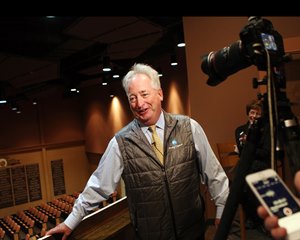No Turf Showcase for Fasig-Tipton in 2018


Fasig-Tipton will not conduct a second Turf Showcase, the sale that was held for the first time in 2017 in an effort to offer yearlings more likely to compete on turf based on their breeding or conformational traits.
Held Sept. 10, on the eve of Keeneland's 12-day September yearling sale, the Turf Showcase resulted in 74 yearlings selling for gross receipts of $5,035,000, an average price of $68,041, and a median of $52,500. Of the 145 through the ring, 71 went unsold for an RNA rate of 48.9%.
Co-sale toppers of $250,000 were colts by the late stallion Scat Daddy.
"We do not plan on conducting the Turf Showcase in 2018," Fasig-Tipton president Boyd Browning said Dec. 13. "We saw the market response wasn't as strong as we hoped. I am little disappointed that it didn't do better. We try like hell, but ultimately the men and women who buy and sell horses with us are the judge and jury. Any time you try a new idea you never know how the market is going to treat it."
Among the reasons Fasig-Tipton officials believed there was a need for a sale oriented toward grass horses was the recent success of American-bred horses abroad—especially at the prestigious Royal Ascot meeting in Great Britain, as well as the prevalence of grass racing opportunities in the U.S. In 2017, 188 graded races were carded in the U.S. on grass surfaces, representing 41% of all graded stakes. Also, there has been an influx of racehorses that excelled on grass added to the stallion ranks in Kentucky in recent years.
"I think reasons for the sale were valid and I think there are still tremendous opportunities available for turf horses in the U.S. and I hope we increased the awareness of it," Browning continued. "We don't make the market; we just serve the market."
Following the sale, Browning said the numbers could have been due to tentativeness by buyers to embrace change and the challenge of recruiting the right types of horses for a niche sale.
"I think one thing we learned on the buyer side is that it takes time to change behavior," he said. "They came, they shopped, and some bought, but not as many bought as shopped. It does take time to change behavior, and they wanted to come and see what the horses were like, and to get a feel for the sale and a feel for how the market was going to react to a lot of this."
Duncan Taylor of Taylor Made Sales Agency said after the Turf Showcase that the results indicated a paucity of quality horses needed to sustain a niche sale like the Turf Showcase.
"The market in America for turf horses is that, if you have a really good turf horse, you can sell it, but if you have an average to below-average (horse), it's tough to sell it," Taylor said, adding there appeared to not be much of a European presence on the buyer bench. "That wasn't pushing the demand so Americans got to buy what they wanted."
